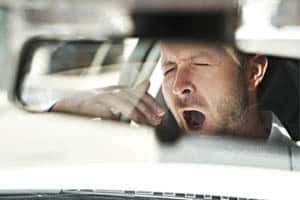
Following the end of daylight savings time every fall, we see a significant uptick of accidents involving drowsy drivers. To help mitigate this, The National Sleep Foundation observes Drowsy Driving Prevention Week November 7th through the 14th this year, in order to bring attention to and encourage safety precautions in our community to prevent falling asleep at the wheel. Also called driver fatigue or tired driving, drowsy driving can be alarming at the very least, and in the worst cases, fatal. It could happen to anyone and at any time.
Luckily, there are plenty of measures you and your family can take to prevent falling asleep at the wheel, which could lead to drowsy driving-related accidents, injuries, and fatalities.
Facts and Stats
To some, falling asleep at the wheel may seem a bit out of the ordinary — but it happens much more often than you think. Each year, drowsy driving is responsible for 100,000 crashes, 71,000 injuries, and 1,550 fatalities, according to the National Safety Council (NSC). Drowsy driving even contributed to 9.5% of car crashes in general.
These accidents happen at various times of the day and night, specifically early morning hours, mid-afternoon, and late at night. Therefore, it is important to be alert and aware of drowsy driving on the road at any time.
Who Is at Risk of Drowsy Driving Accidents?
First and foremost, drivers who do not get enough sleep. Inadequate rest and sleep deprivation are the leading causes of driver fatigue and drowsy driving accidents. In addition, those with medical conditions, or those who hold certain occupations may be more at risk of falling asleep behind the wheel, such as:
- Commercial drivers who drive vehicles such as tow trucks, tractor-trailers, and buses
- Shift workers who work at night or in long shifts
- Drivers with untreated sleep disorders such as narcolepsy and sleep apnea
- Drivers who use medications that may cause drowsiness
Warning Signs of Drowsy Driving
If you are a driver, especially if mentioned above, you may be at risk of driver fatigue and getting into a drowsy driving-related accident at some point in time. To prevent an accident, be sure to look out for these warning signs of drowsy driving when behind the wheel:
- Inability to focus,
- Delayed reaction times,
- Poor judgment,
- Inability to judge distances and speeds,
- Yawning or blinking frequently,
- Difficulty remembering the past few miles driven,
- Missing your exit,
- Drifting or swerving from your lane,
- Hitting a rumble strip on the side or middle of the road,
- And, most notably, falling asleep.
Acclaimed Attorneys Serving the Triad Community
At Daggett Shuler, we don’t just help get the maximum compensation for injury victims; we strive to educate our community about their health and safety needs and make a positive impact on our community. Have you or a loved one been in an accident due to driver fatigue and are struggling to get through the claims process? Submit an inquiry form on our website or call our office at 336-724-1234 for a free legal consultation today. Always remember to stay safe both on and off the roads — and that you can always depend on Daggett Shuler.

